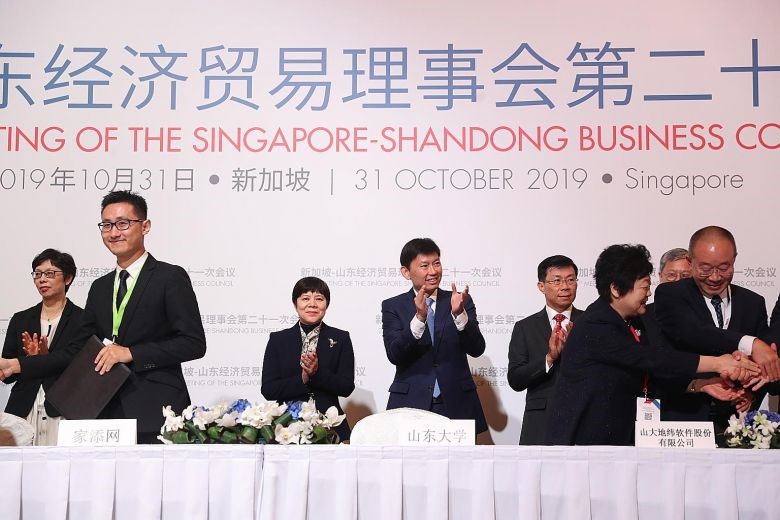

Connectivity and trade, modern services and sustainable development among priorities
Singapore companies can soon start offering professional services such as financing, listing and legal advisory to Shandong firms seeking to internationalise, on a new platform by Enterprise Singapore and the Qingdao Bureau of Commerce.
The initiative is expected to be launched by the first half of next year, with interested companies such as OCBC Bank, United Overseas Bank, Rajah & Tann and the Singapore Exchange, said Senior Minister of State for Trade and Industry Chee Hong Tat yesterday.
This is among the ways Singapore and China's Shandong province can collaborate further on connectivity and trade, modern services, sustainable development, and people-to-people exchanges, he added.
Mr Chee and Shandong Vice-Governor Ren Airong listed these priorities for the two markets at the 21st meeting of the Singapore-Shandong Business Council, which they co-chair.
Mr Chee said such collaborations with key Chinese provinces underpin the Republic's strong bilateral relationship with China.
In the first half of this year, bilateral trade between Singapore and Shandong grew 3.9 per cent over the same period last year to reach 7.28 billion yuan (S$1.4 billion), according to the Shandong Department of Commerce.
There are 411 Singapore enterprises in Shandong - the second-most populous province in China - and 139 Shandong enterprises in Singapore.
"Against the current global economic environment, we need, now more than ever, to reaffirm our commitment to global trade and demonstrate how like-minded partners can work together to achieve win-win outcomes," said Mr Chee at Shangri-La Hotel Singapore.
Ms Ren said with Shandong's pilot free trade zone announced in August, focusing on areas such as information technology, healthcare, modern services and marine chemicals, there will be more room for cooperation with Singapore.
"We hope to work together to expand into third-party foreign markets and optimise resources," she said, addressing more than 180 government and business representatives from both sides.
Mr Chee told reporters after the event that good progress has been made since last year's meeting.
Several Singapore companies in early childhood education, logistics and modern services have made inroads in Shandong, while Shandong consumer electronics firm Haier has set up an innovation centre here.
The Nanyang Technological University (NTU) and Shandong University have also set up a research centre on artificial intelligence.
Going forward, the council wants to strengthen connectivity and trade between Shandong and Singapore, and between the region of North China and South-east Asia.
Singapore traders and distributors can explore Shandong - China's leading agricultural province - as a source of higher-value produce such as hawthorn berry and winter jujube, which local company Siji Trading is looking at exporting into other markets, said Mr Chee in his speech.
Logistics and warehousing companies can also support trade flows.
Mr Chee said the second area of collaboration in modern services will support companies from both sides to expand into each other's markets. Singapore can also serve as an innovation hub and gateway for Shandong companies interested in investing in South-east Asia.
For sustainable development, many Singapore companies have experience and expertise to offer in transforming traditional industries such as oil and gas, he added.
For instance, Singapore's Vac-Tech Engineering is partnering Yantai city's oilfield services company Jereh Group to develop an advanced tank cleaning solution.
Finally, Mr Chee said there will be more opportunities for Singapore and Shandong students to interact.
NTU and Shandong University signed an agreement yesterday with Shanda Dareway Software and Jinan Zhangqiu District government to develop healthcare technologies and facilitate talent exchanges, among other things.
This was one of 12 agreements signed at the council meeting, witnessed by Mr Chee and Ms Ren.
MAKING INROADS IN CHINA WITH DRIVER TRAINING
When it rains, a software will push content about driving safely on wet roads to users. In winter, it might give tips on driving in icy conditions.
This is what Bamboo System Technology managing director Yu Hao hopes to achieve through partnerships with companies in China, where the Singapore-based online learning platform provider is developing a driving training system.
To begin with, the system will provide online content for drivers - especially those of heavy vehicles such as buses and trucks - to do blended learning. This is a hybrid approach where web-based training is done alongside classroom teaching.
"This will make it more flexible for them to continue to learn driving skills and tips outside the classroom," said Mr Yu.
The system will also allow the authorities to check the training participation of drivers renewing their licences.
Bamboo, which was founded in 2014, signed an agreement yesterday with Qingdao Weidong Education Cloud.
The partner will develop content for the training system, which is set to be piloted by the year end in Guangdong province.
"We need local partners' support because it's difficult for a Singapore company to do all the testing, integration, customisation and user trials for such a complex project," said Mr Yu.
If successful, the system can be rolled out to the other provinces in China, a country that accounted for about 21 per cent of global road traffic deaths in 2017.
Bamboo's project signing was one of 12 completed at the 21st Singapore-Shandong Business Council meeting yesterday.
Other agreements include Enterprise Singapore working with the Qingdao Municipal People's government to encourage more enterprises to do business in both markets.
Joanna Seow